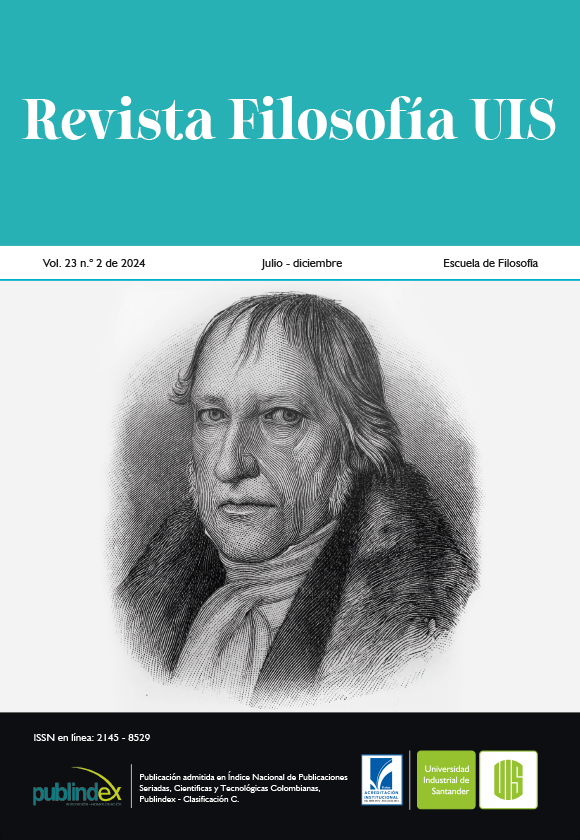Banal Evil and Conscience: A Reinterpretation from Hannah Arendt and Thomas Aquinas
Published 2024-08-23
Keywords
- Arendt,
- saint Thomas Aquinas,
- evil banal,
- thoughtlessness,
- conscience
How to Cite
Copyright (c) 2024 Revista Filosofía UIS

This work is licensed under a Creative Commons Attribution 4.0 International License.
Abstract
The thesis of this article is that banal evil refers to a deformed consciousness. Arendt's own works suggest such an understanding of banal evil. Although various authors have emphasized the importance of conscience in the formation of banal evil, none, as far as can be seen, has chosen to define it in this way. Nor, as far as is known, did Arendt. The German philosopher connects thinking and conscience. She understands the latter as a by-product of the former. Therefore, the other definition of banal evil, the one that links it to the inability to think, cannot be abandoned. Arendt privileges this definition and does not reject the other. However, thinking, as Arendt understands it, in its function of separating man from evil and judging the facts of experience, comes to resemble conscience, since the latter also has this task. Moreover, conscience functions in a dialogical way, just as Arendt suggests that thinking does. Arendt does not clarify how thinking leads man to the moral truth about his actions, nor how it can be distorted. Nor does she inquire deeply into conscience. All this has led her to be interpreted by St. Thomas, in whom can be found some key contributions to resolving some questions that Arendt left open about banal evil.
Downloads
References
- Adair-Toteff, C. (2022). Arendt on Conscience. Rivista Trimestrale di Scienza dell’Amministrazione. Studi di teoria e ricerca sociale, 4, 1-22. https://rtsa.eu/RTSA_4_2022_Toteff.pdf
- Arendt, H. (1966). Basic Moral Propositions. Library of Congress. https://www.loc.gov/item/mss1105600994/
- Arendt, H. (2002). La vida del espíritu (F. Birulés y C. Correal, trads.). Ediciones Paidós.
- Arendt, H. (2007). Responsabilidad y juicio (M. Candel y F. Birulés, trads.). Ediciones Paidós.
- Arendt, H. (2010). Eichmann en Jerusalén (C. Ribalta, trad.). Penguim Random House Grupo Editorial.
- Aristóteles (2014). Ética a Nicómaco (J. Pallí Bonet, trad.). Editorial Gredos.
- Bernstein, R. (1997). “The Banality of Evil” Reconsidered. En C. Calhoun y J. McGowan (ed.), Hannah Arendt and the Meaning of Politics (pp. 297-322). University of Minnesota Press.
- Bernstein, R. (2000). ¿Cambió Hannah Arendt de opinión? Del mal radical a la banalidad del mal. En F. Birulés (comp.), Hannah Arendt: el orgullo de pensar (pp. 235-257). Editorial Gedisa.
- Bernstein, R. (2002). El mal radical. Una indagación filosófica (M. Burello, trad.). Ediciones Lilmod.
- Bernstein, R. (2019). ¿Por qué leer a Hannah Arendt hoy? (F. Colmenares y S. Rey, trads.). Editorial Gedisa.
- Formosa, P. (2010). Thinking, Conscience and Acting in Times of Crises. En A. Schaap, D. Celermajer y V. Karalis (Eds.), Power, Judgment, and Political Evil. In Conversation with Hannah Arendt (pp. 89-103). Taylor & Francis Group.
- Kohn, J. (1996). Evil and Plurality: Hannah Arendt’s Way to The Life of the Mind, I. En L. May y J. Kohn (Eds.), Hannah Arendt. Twenty Years Later (pp. 147-178). MIT Press.
- Kohn, J. (s. f.). Evil: The Crime against Humanity. Library of Congress. https://www.loc.gov/collections/hannah-arendt-papers/articles-and-essays/evil-the-crime-against-humanity/
- LaFay, M. (2014). Hannah Arendt and the Specter of Totalitarianism. Palgrave Macmillan.
- Láriz Durón, J. J. (2022). La naturaleza del mal: un problema para el ser humano. Revista Filosofía UIS, 21(2), 79-100. https://doi.org/10.18273/revfil.v21n2-2022004
- Marrades, J. (2002). La radicalidad del mal banal. Logos. Anales del Seminario de Metafísica, 35, 79-103. https://revistas.ucm.es/index.php/ASEM/article/view/ASEM0202110079A
- Petherbridge, D. (2016). Between thinking and action: Arendt on conscience and civil disobedience. Philosophy and Social Criticism, 42(10), 971-981. https://doi.org/10.1177/0191453716631170
- Pieper, J. (2017). Las virtudes fundamentales (C. Melches, M Garrido, R. G. Peña, A. Candau y R. Pániker, trads.). Ediciones Rialp.
- Platón (2021). Diálogos V (M. I. Santa Cruz, Á. Vallejo Campos y N. L. Cordero, trads.). Editorial Gredos.
- Sanabria Cucalón, M. C. (2017). La noción arendtiana de “banalidad del mal” a partir de la idea de irreflexividad. Agora. Papeles de Filosofía, 36(2), 133-149. https://doi.org/10.15304/ag.36.2.3524
- Serrano de Haro, A. (1997). Sobre la trivialidad del mal. A modo de introducción al pensamiento de Hannah Arendt. Letras de Deusto, 27(74), 25-42.
- Tomás de Aquino (2015a). Comentario a las sentencias de Pedro Lombardo (Volumen II/2) (J. Cruz Cruz, ed.). EUNSA.
- Tomás de Aquino (2015b) Cuestiones disputadas sobre el mal (E. Téllez, trad.). EUNSA.
- Tomás de Aquino (2016). Cuestiones disputadas sobre la verdad (Tomo II) (Á. L. González, J. F. Sellés y M. Idoya Zorroza, Eds.). EUNSA.
- Tomás de Aquino (2018). Suma Teológica (Tomo V) (T. Urbano, OP, C Aniz, OP y P. Lumbreras, OP, trads.). Biblioteca de Autores Cristianos.
- Vetlesen, J. A. (2001). Hannah Arendt on Conscience and Evil. Philosophy & Social Criticism, 27(5), 1-33. https://doi.org/10.1177/019145370102700501
- Villa, D. (1999). Politics, Philosophy, Terror. Essays on the Thought of Hannah Arendt. Princeton University Press.
- Villa, D. (2017). Eichmann in Jerusalem: Conscience, Normality, and the “Rule of Narrative”. En R. J. Golsan y S. Misemer (ed.), The Trial that Never Ends: Hannah Arendt’s Eichmann in Jerusalem in Retrospect (pp. 43-66). University of Toronto Press.
- Villa, D. (2023). Hannah Arendt. A Very Short Introduction. Oxford University Press.
- Young-Bruehl, E. (1993). Hannah Arendt (M. Lloris Valdés, trad.). Edicions Alfons el Magnánim.
- Young-Bruehl, E. (2006). Why arendt matters. Yale University Press.

